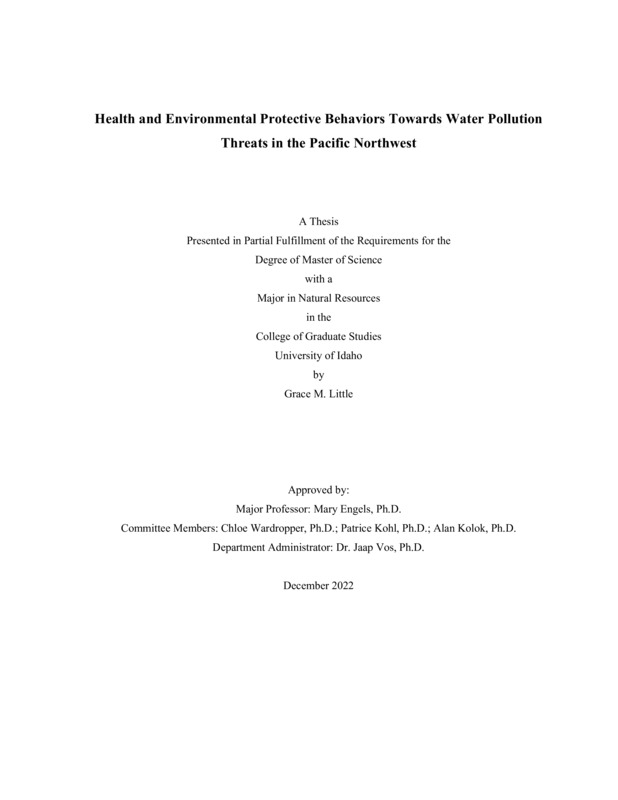Health and Environmental Protective Behaviors Towards Water Pollution Threats in the Pacific Northwest
Little, Grace Margaret. (2022-12). Health and Environmental Protective Behaviors Towards Water Pollution Threats in the Pacific Northwest. Theses and Dissertations Collection, University of Idaho Library Digital Collections. https://www.lib.uidaho.edu/digital/etd/items/little_idaho_0089n_12498.html
- Title:
- Health and Environmental Protective Behaviors Towards Water Pollution Threats in the Pacific Northwest
- Author:
- Little, Grace Margaret
- ORCID:
- 0000-0001-9771-471X
- Date:
- 2022-12
- Program:
- Natural Resources
- Subject Category:
- Social research; Water resources management; Environmental science
- Abstract:
-
Water pollutants remain a pertinent public health and environmental issue despite multiple policies to control water pollutants from entering the environment. Community members engaging in both health and environmental protective behaviors can prevent excess water pollutants from entering water bodies, protect drinking water and their personal health. Existing social science research has primarily focused on either health protective behaviors or environmental protective behaviors, but rarely considered these behaviors together. As such, little is known about what motivates both types of behaviors within the same environmental issue. This thesis contributes to a broader understanding of factors that encourage both health and environmental protective behaviors in the Pacific Northwest (PNW) using data from an online survey (n = 621). In the first empirical chapter, I 1) explore threat and coping variables that contribute to both types of behaviors and 2) explore the relationships between subjective knowledge and sociodemographic variables that contribute to both types of behaviors. Results reveal that high self-efficacy significantly predicted both health and environmental protective behavioral intentions for water pollutants, while perceived severity of the threat was only significant in the environmental model. Perceived vulnerability and response efficacy were significant in both models. Education level, political affiliation, and subjective knowledge were significant predictors of environmental protective behavioral intentions, but not health protective behavioral intentions. Overall, the results of this study suggest that when communicating environmental risks of water pollution, highlighting self-efficacy in messaging is particularly important to promote protective environmental and personal health behavior. In the second empirical chapter, I further investigate motivators of environmental protective behavior through communication frames. There has been little experimental research testing how to effectively communicate information about water pollution to encourage protective behavior. This project used a message framing experiment embedded in an online survey to determine how (a) personal versus impersonal risk frames and (b) self-efficacy versus no self-efficacy frame were effective in encouraging health and environmental protective behavior intentions. We conducted parallel studies with samples from two populations: the Qualtrics panel (n=621) and a university student population (n=178). We found that among the general population, no communication frame was more effective than another to encourage behaviors. Among the student population, we found that the personal risk frame with no self-efficacy message had a significantly higher effect on respondents’ intentions to engage in environmental protective behaviors compared to messages with self-efficacy. We found that the average respondent reported high intentions to take protective behaviors toward water pollution, which may suggest that self-efficacy messaging is not necessary when communicating personal risks for a high salience issue. In the Conclusion, I discuss implications for results from both empirical chapters in the context of communication best practices for health and environmental protective behavior change and opportunities for future research.
- Description:
- masters, M.S., Natural Resources -- University of Idaho - College of Graduate Studies, 2022-12
- Major Professor:
- Engels, Mary
- Committee:
- Wardropper, Chloe; Kolok, Alan; Kohl, Patrice; Vos, Jaap
- Defense Date:
- 2022-12
- Identifier:
- Little_idaho_0089N_12498
- Type:
- Text
- Format Original:
- Format:
- application/pdf
- Rights:
- In Copyright - Educational Use Permitted. For more information, please contact University of Idaho Library Special Collections and Archives Department at libspec@uidaho.edu.
- Standardized Rights:
- http://rightsstatements.org/vocab/InC-EDU/1.0/

